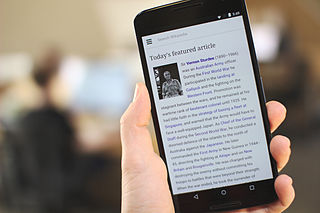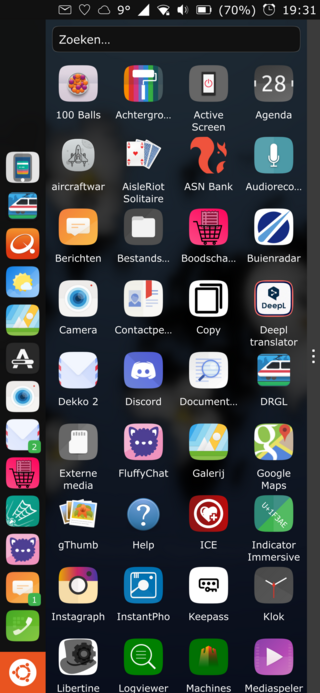
A smartphone is a mobile device that combines the functionality of a traditional mobile phone with advanced computing capabilities. It typically has a touchscreen interface, allowing users to access a wide range of applications and services, such as web browsing, email, and social media, as well as multimedia playback and streaming. Smartphones also have built-in cameras, GPS navigation, and support for various communication methods, including voice calls, text messaging, and internet-based messaging apps.
Sony Mobile Communications Inc. was a multinational telecommunications company founded on October 1, 2001, as a joint venture between Sony Corporation and Ericsson. It was originally incorporated as Sony Ericsson Mobile Communications, and headquartered in London, England, until Sony acquired Ericsson's share in the venture on February 16, 2012. On April 1, 2021, Sony integrated its electronics businesses including Sony Mobile into one company called Sony Corporation.

ESET NOD32 Antivirus, commonly known as NOD32, is an antivirus software package made by the Slovak company ESET. ESET NOD32 Antivirus is sold in two editions, Home Edition and Business Edition. The Business Edition packages add ESET Remote Administrator allowing for server deployment and management, mirroring of threat signature database updates and the ability to install on Microsoft Windows Server operating systems.
Computer operating systems based on the Linux kernel are used in embedded systems such as consumer electronics, in-vehicle infotainment (IVI), networking equipment, machine control, industrial automation, navigation equipment, spacecraft flight software, and medical instruments in general.
Android is a mobile operating system based on a modified version of the Linux kernel and other open-source software, designed primarily for touchscreen mobile devices such as smartphones and tablets. Android is developed by a consortium of developers known as the Open Handset Alliance, though its most widely used version is primarily developed by Google. It was unveiled in November 2007, with the first commercial Android device, the HTC Dream, being launched in September 2008.
A mobile operating system is an operating system used for smartphones, tablets, smartwatches, smartglasses, or other non-laptop personal mobile computing devices. While computers such as typical/mobile laptops are "mobile", the operating systems used on them are generally not considered mobile, as they were originally designed for desktop computers that historically did not have or need specific mobile features. This line distinguishing mobile and other forms has become blurred in recent years, due to the fact that newer devices have become smaller and more mobile unlike hardware of the past. Key notabilities blurring this line are the introduction of tablet computers, light-weight laptops, and the hybridization of the two in 2-in-1 PCs.
OPhone, or OMS, is a mobile operating system running on the Linux kernel. It is based on technologies initially developed by Android Inc., a firm later purchased by Google, and work done by the Open Handset Alliance. The OPhone OS has appeared only on China Mobile phones, and the software was developed for China Mobile by software firm Borqs. A modified version of OMS has appeared on other carriers as Android+, also developed and maintained by Borqs. Android has been modified for local Chinese markets by China Mobile's OPhone Software Developers Network.

A smartwatch is a portable and wearable computer device in a form of a watch; modern smartwatches provide a local touchscreen interface for daily use, while an associated smartphone app provides management and telemetry, such as long-term biomonitoring. While early models could perform basic tasks such as calculations, digital time telling, translations, and game-playing, smartwatches released since 2015 have more general functionality closer to smartphones, including mobile apps, a mobile operating system, and WiFi/Bluetooth connectivity. Some smartwatches function as portable media players, with FM radio and playback of digital audio and video files via a Bluetooth headset. Some models, called watch phones, have mobile cellular functionality such as making telephone calls.
Mobile security, or mobile device security, is the protection of smartphones, tablets, and laptops from threats associated with wireless computing. It has become increasingly important in mobile computing. The security of personal and business information now stored on smartphones is of particular concern.
An app store, also called an app marketplace or app catalog, is a type of digital distribution platform for computer software called applications, often in a mobile context. Apps provide a specific set of functions which, by definition, do not include the running of the computer itself. Complex software designed for use on a personal computer, for example, may have a related app designed for use on a mobile device. Today apps are normally designed to run on a specific operating system—such as the contemporary iOS, macOS, Windows, Linux or Android—but in the past mobile carriers had their own portals for apps and related media content.

Firefox OS is a discontinued open-source operating system – made for smartphones, tablet computers, smart TVs, and dongles designed by Mozilla and external contributors. It is based on the rendering engine of the Firefox web browser, Gecko, and on the Linux kernel. It was first commercially released in 2014.

Ubuntu Touch is a mobile version of the Ubuntu operating system, being developed by the UBports community. Its user interface is written in Qt, and is designed primarily for touchscreen mobile devices such as smartphones and tablet computers, but the original goal of convergence was intended to bring Ubuntu Touch to laptops, desktops, IOT devices and TVs for a complete unified user experience.
Besides the Linux distributions designed for general-purpose use on desktops and servers, distributions may be specialized for different purposes including computer architecture support, embedded systems, stability, security, localization to a specific region or language, targeting of specific user groups, support for real-time applications, or commitment to a given desktop environment. Furthermore, some distributions deliberately include only free software. As of 2015, over four hundred Linux distributions are actively developed, with about a dozen distributions being most popular for general-purpose use.

Librem is a line of computers manufactured by Purism, SPC featuring free (libre) software. The laptop line is designed to protect privacy and freedom by providing no non-free (proprietary) software in the operating system or kernel, avoiding the Intel Active Management Technology, and gradually freeing and securing firmware. Librem laptops feature hardware kill switches for the microphone, webcam, Bluetooth and Wi-Fi.

postmarketOS is an operating system primarily for smartphones, based on the Alpine Linux distribution.

HarmonyOS (HMOS) is a distributed operating system developed by Huawei for smartphones, tablets, smart TVs, smart watches, personal computers and other smart devices. It has a multikernel design with dual frameworks: the operating system selects suitable kernels from the abstraction layer in the case of devices that use diverse resources. The operating system was officially launched by Huawei in August 2019.

GrapheneOS is an Android-based, open source, privacy and security-focused mobile operating system for selected Google Pixel devices, including smartphones, tablets and foldables that is recommended by Edward Snowden.

The Librem 5 is a smartphone manufactured by Purism that is part of their Librem line of products. The phone is designed with the goal of using free software whenever possible, includes PureOS, a Linux operating system, by default, and as of 2021 is the only smartphone recommended by the Free Software Foundation. Like other Librem products, the Librem 5 focuses on privacy and freedom, and includes features like hardware kill switches, and easily-replaceable components. Its name, with a numerical "5", refers to its screen size, and not a release version. After an announcement on 24 August 2017, the distribution of developer kits and limited pre-release models occurred throughout 2019 and most of 2020. The first mass-production version of the Librem 5 was shipped on 18 November 2020.

The PinePhone is a smartphone developed by Hong Kong-based computer manufacturer Pine64, intended to allow the user to have full control over the device. Measures to ensure this are: running mainline Linux-based mobile operating systems, assembling the phone with screws, and simplifying the disassembly for repairs and upgrades. LTE, GPS, Wi-Fi, Bluetooth and both cameras can be physically switched off. The PinePhone ships with the Manjaro Linux operating system using the Plasma Mobile graphic interface, although other distributions can be installed by users.










